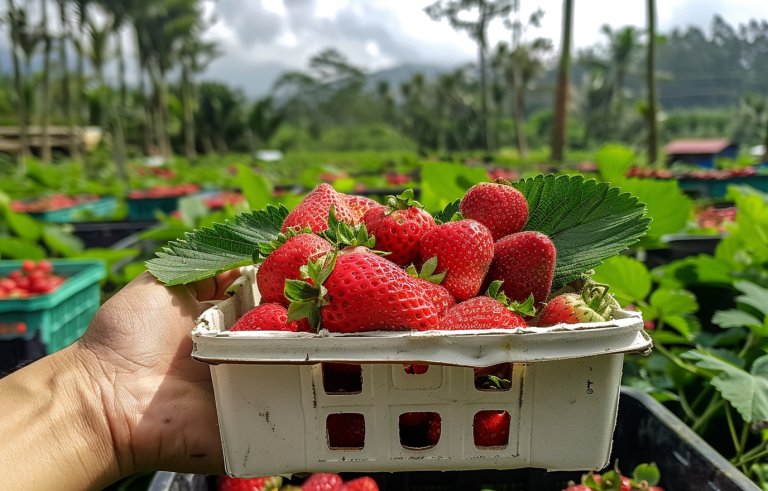
Are you an entrepreneur looking to start a unique business venture in Bali, Indonesia?
Consider the exciting world of agro-tourism! Under the Indonesian Standard Industrial Classification (KBLI) code 93231, foreign investment companies can start farming and plantation businesses that offer tourists an immersive experience in agriculture.
This code allows for the management of tourist attractions within agricultural areas, including food crops, horticulture, plantations, fisheries, and livestock as the main business, while providing various facilities such as food, beverage, and accommodation services.
Agro-tourism activities encompass production, collection, conservation, processing, and community cultural experiences, such as Taman Buah Mekarsari (West Java), Salak Sleman Tourism Plantation (Yogyakarta), Apple Plantation Tourism in Batu (Malang, East Java), as well as Coffeenery and Winery ventures.
Overview
Agro-Tourism under KBLI Code 93231 involves the management of tourism attractions using agricultural areas including food crops and horticulture, plantations, fisheries, and livestock as the core business.
These ventures can be enhanced by providing a variety of facilities, such as food and beverage services and accommodation.
Activities within these ventures include production, collection, conservation, processing, and local cultural activities, exemplified by Taman Buah Mekarsari (West Java), Wisata Kebun Salak Sleman (Yogyakarta), and Wisata Kebun Apel Batu (Malang, East Java), as well as Coffeenery and Winery.
Legal Basis
The legal framework governing Agro-Tourism is regulated by the Minister of Tourism and Creative Economy/Head of the Indonesian Tourism and Creative Economy Agency Regulation Number 7 of 2021.
This regulation outlines the standards and requirements for establishing and operating tourism businesses within Indonesia, including those based in agricultural settings.
Type of License
Businesses operating under KBLI Code 93231 typically require a Standard Business Certificate, which serves as the formal licensing to commence operations.
This certificate confirms the business’s compliance with local regulations and standards.
Coverage of Service
Services covered under this business model include not only agricultural activities but also the integration of tourism services such as guided tours, cultural demonstrations, and on-site accommodations and dining facilities that highlight local culinary traditions.
Business Scale, Land Area, and Risk Level
The scale of the business is classified as large scale.
However, there are no specific regulations concerning the minimum land area required.
The risk level associated with Agro-Tourism businesses is considered medium to low, reflecting a relatively stable and sustainable business environment.
Authorities Granting Licenses
Licensing authority for Agro-Tourism ventures under KBLI Code 93231 is granted by the Minister or the Head of the Indonesian Tourism and Creative Economy Agency.
These authorities are responsible for reviewing applications and issuing the necessary business certifications.
Requirements and Obligations for Business Licensing
While there are no specified general requirements for business licensing beyond obtaining a Standard Business Certificate, businesses must comply with certain obligations to maintain their licenses.
These obligations include obtaining an Environmental Management Effort and Environmental Monitoring Effort certificate (SPPL) and maintaining the Standard Business Certificate.
Frequently Asked Questions
-
What types of agro-tourism activities can I include in my business under KBLI Code 93231?
Your agro-tourism business can incorporate a variety of activities including the production, collection, conservation, and processing of agricultural products. Additionally, you can offer cultural experiences related to the local community, such as visits to Taman Buah Mekarsari, Salak Sleman Tourism Plantation, and Apple Plantation Tourism in Batu.
-
How does agro-tourism under KBLI Code 93231 benefit local communities in Bali?
Agro-tourism ventures not only boost local economies through tourism but also promote local culture and traditions. They provide employment opportunities and support sustainable agricultural practices, thereby enhancing community livelihoods.
-
What facilities can I provide to enhance the agro-tourism experience in Bali?
To enhance the agro-tourism experience, you can offer facilities like food and beverage services featuring local cuisine, on-site accommodations, guided tours of the plantation, and workshops or demonstrations of local farming and processing techniques.
-
What type of license is required to operate an agro-tourism business in Bali?
An agro-tourism business under KBLI Code 93231 requires a Standard Business Certificate to operate, ensuring compliance with local regulations and standards.
-
Can foreign investors fully own an agro-tourism business in Bali, or are there ownership restrictions?
Foreign investors can fully own an agro-tourism business under KBLI Code 93231, as long as they comply with Indonesian business laws and regulations, which are designed to encourage foreign investment while ensuring economic benefits for the local community.
-
What potential risks should I consider before starting an agro-tourism business in Bali?
While agro-tourism is generally a low to medium risk venture, potential risks include fluctuating market demand, climate impacts on agriculture, and the need for continuous engagement with local communities and authorities.
Contact Us for Agro-Tourism Business in Bali, Indonesia.







